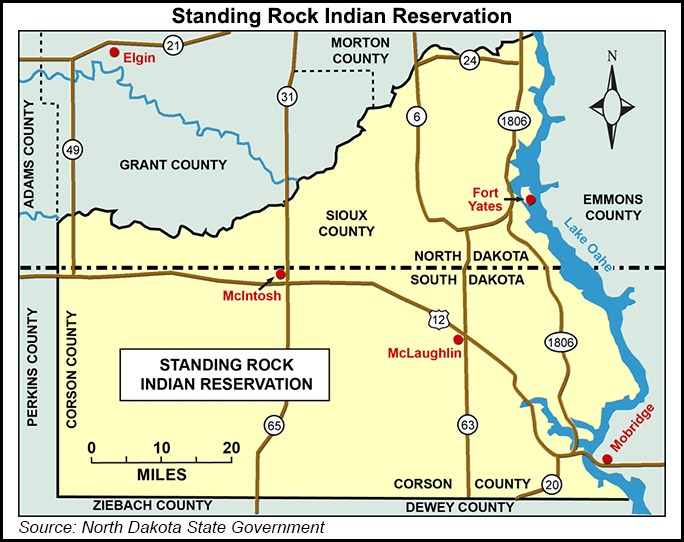Bakken Shale | E&P | NGI All News Access | Regulatory
Sioux Request for Dakota Access Pipeline Injunction Denied by Appellate Court
A three-judge panel in a federal appellate court in Washington, DC, on Sunday denied a request from the Standing Rock Sioux Tribe for an injunction to block ongoing construction of the $3.8 billion Dakota Access oil pipeline. Backers of the four-state project hailed the court action, and the Native American opposition vowed to continue their fight.

The fight is focused on a small portion of the nearly 1,200-mile pipeline project in south-central North Dakota near the Standing Rock reservation and where Dakota Access plans to cross under a part of the Missouri River where a dam forms Lake Oahe (see Shale Daily, Oct. 6). An easement from the U.S. Army Corps of Engineers (USACE) is still being debated by federal officials.
In denying the emergency motion for the administrative injunction, Judges Cornelia T.L. Pillard, Janice Rogers Brown and Thomas Griffith said their action was not the final word, noting the USACE, in consultation with ongoing discussions with the federal Departments of Interior and Justice, must still grant the water crossing easement.
“Intervenor Dakota Access Pipeline LLC has rights of access to the limited portion of the pipeline corridor not yet cleared — where the Sioux Tribe alleges additional historic sites are at risk,” the judges said in a two-paragraph order from the U.S. Court of Appeals for the District of Columbia Circuit.
The judges concluded that the tribe’s legal team “had not carried its burden of persuasion” in meeting certain criteria the court looks to in deciding whether to invoke an injunction.
Standing Rock Sioux Chairman Dave Archambault II said the tribe and its fellow protesters “are not backing down from this fight; we will not rest until our lands, people, waters and sacred places are permanently protected from this destructive pipeline.”
In the meantime, while other legal and political processes are being worked out, Archambault asked Dakota Access to voluntarily stop construction, something the company is not obligated to do, except on some Interior Department-specified federal lands.
“We continue to believe that as long as the ultimate administrative and judicial decisions are based on facts, science, engineering and the rule of law, the pipeline will become operational without additional delay,” said a spokesperson for the Midwest Alliance for Infrastructure Now coalition, which was “pleased, but not surprised” with the appellate court action.
During oral arguments last Wednesday, judges and the Sioux Tribe’s attorney narrowed the scope of the injunction against the pipeline project, but no conclusions were reached by the court, and the judges expressed some questions about the claims of the parties.
© 2024 Natural Gas Intelligence. All rights reserved.
ISSN © 2577-9877 | ISSN © 2158-8023 |
